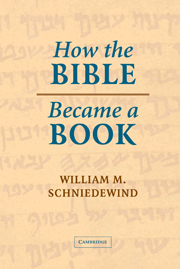Book contents
- Frontmatter
- Contents
- List of Figures
- Preface
- Abbreviations
- 1 How the Bible Became a Book
- 2 The Numinous Power of Writing
- 3 Writing and the State
- 4 Writing in Early Israel
- 5 Hezekiah and the Beginning of Biblical Literature
- 6 Josiah and the Text Revolution
- 7 How the Torah Became a Text
- 8 Writing in Exile
- 9 Scripture in the Shadow of the Temple
- 10 Epilogue
- Suggested Further Reading
- Notes
- Index
5 - Hezekiah and the Beginning of Biblical Literature
Published online by Cambridge University Press: 16 July 2009
- Frontmatter
- Contents
- List of Figures
- Preface
- Abbreviations
- 1 How the Bible Became a Book
- 2 The Numinous Power of Writing
- 3 Writing and the State
- 4 Writing in Early Israel
- 5 Hezekiah and the Beginning of Biblical Literature
- 6 Josiah and the Text Revolution
- 7 How the Torah Became a Text
- 8 Writing in Exile
- 9 Scripture in the Shadow of the Temple
- 10 Epilogue
- Suggested Further Reading
- Notes
- Index
Summary
The Bible as we know it began to take shape in Jerusalem in the late eighth century b.c.e., in the days of Isaiah, the prophet, and Hezekiah, the king of Judah. Powerful social and political forces converged at that time resulting in the collection of earlier, mostly oral, traditions and the writing of new texts. In addition, Jerusalem emerged then as a powerful political center. The small, isolated town of Jerusalem mushroomed into a large metropolis. Writing became part of the urban bureaucracy as well as a political extension of growing royal power. These changes would be the catalyst for the collecting and composing of biblical literature. It was the dawn of the literature of the Bible.
What were the local catalysts for such a dramatic transformation of Judean society? Why did biblical literature begin to flourish in the late eighth century? The answers to these questions begin with the rise of the Assyrian Empire and the social, economic, and political challenges that it would present. In particular, the exile of the northern kingdom by Assyria and the subsequent urbanization of the rural south were the catalysts for literary activity that resulted in the composition of extended portions of the Hebrew Bible. The exile of northern Israel also gave rise to the prophetic works of Amos, Hosea, Micah, and Isaiah of Jerusalem, to priestly liturgies and to ritual texts, as well as to a pre-Deuteronomic historical work.
- Type
- Chapter
- Information
- How the Bible Became a BookThe Textualization of Ancient Israel, pp. 64 - 90Publisher: Cambridge University PressPrint publication year: 2004



